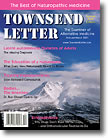


From the
Townsend Letter |
||
Letter from the Publisher |
||
In
last month's column, I worried about how the political change
of 2006 might impact the politics of alternative medicine. I made a
tacit assumption that Democrats might push for more regulations of
alternative medical practices and nutritional medicine, repudiating
the laissez-faire style of the Republicans. We didn't really
need to wait long. In December, even before the freshmen Democrats
took office, and while Republican office staff were huddled in the
Congressional basement putting out classified ads for new employment,
both the Senate and the House passed legislation regulating over-the-counter
drugs and nutritional supplements.
Our February/March
2007 issue focuses on the best of naturopathic medicine. We congratulate
the naturopathic students, faculty, and clinicians who are winners
in our second annual competition, and we thank all the entrants. In general,
submissions for this competition were thoughtful and well-researched. Bastyr
student David Graves' essay, for instance, on Latent Autoimmune Diabetes
of Adults (LADA), considers the presentation of that frequently misdiagnosed
form of diabetes mellitus and reviews possible adjunctive naturopathic treatment
therapies. And in his well-detailed article
on hypothyroidism, Martin Milner,
ND, presents a compelling case for slow-release, compounded thyroid replacement.
Award-winners Jonathan Prousky, ND, ("The Orthomolecular Treatment of
Schizophrenia")
and Ani Hawkinson, UBCNM, ("Nutrigenomics and Nutrigenetics in Whole
Food Nutritional Medicine") also offer noteworthy essays. In addition,
we are pleased to present two companion essays to our prize-winners in which
the deans
of National College of Naturopathic Medicine (essay) and Southwest College of Naturopathic Medicine present their visions
for naturopathic
education in 2007 and the future.
We thank the many individuals who helped to facilitate our competition, including
the deans of naturopathic education at Bastyr University, Bridgeport University
College of Naturopathic Medicine, Canadian College of Naturopathic Medicine,
National College of Naturopathic Medicine, and Southwest College of Naturopathic
Medicine. We would like to encourage all interested students, faculty, and
practicing physicians to submit articles for our next biannual "Best
of Naturopathic Medicine" issue. Jonathan Collin, MD
|
||
![]()
Consult your doctor before using any of the treatments found within this site.
![]()
Subscriptions are available for Townsend Letter, the Examiner of Alternative Medicine magazine, which is published 10 times each year.
Search our pre-2001
archives for further information. Older issues of the printed magazine
are also indexed for your convenience.
1983-2001
indices ; recent indices
Once you find the magazines you'd like to order, please use our convenient form, e-mail subscriptions@townsendletter.com, or call 360.385.6021 (PST).

All rights reserved.
Web site by Sandy Hershelman Designs
